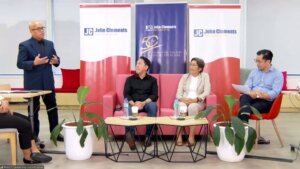Trust and transparency have become defining qualities of effective leadership, especially in an era marked by skepticism and rapid change. This was the central focus of the Weekly with JC session held on May 22, 2025, titled “Leading with Integrity: Building Trust in a Skeptical World.” During the event, esteemed panelists explored how integrity serves as a foundation for building trust, shaping culture, and leading with purpose in today’s complex organizational landscape.
What Integrity in Leadership Really Means
For Daniel Rupinta, Country Head of iRhythm, integrity means “doing the right thing even when no one is watching.” In an organization that manages sensitive patient data, living with integrity is not a slogan—it’s a core operational standard. iRhythm encourages employees to “Live in Integrity” as a central value, shaping both daily behaviors and long-term strategies.
Lora Liza Dioquino, former VP of HR & Organizational Development at Semirara Mining and Power Corp., defines integrity through character, commitment, and consistency. From her HR perspective, integrity must be clearly defined and consistently practiced. Mistakes, she stressed, should be seen as learning opportunities rather than grounds for punishment.
Embedding Integrity into Company Culture
Integrity must be embedded in culture, not just communicated. Daniel emphasized building a system of checks and balances through global compliance partnerships and transparent internal policies. He advocates for top-down empowerment, allowing all levels of the organization to make values-based decisions.
Liza supports a culture where employees feel safe to grow. Instead of penalizing mistakes, HR leaders should offer guidance and coaching. When leaders model ethical behavior and ensure alignment between values and actions, trust naturally follows.
The Role of Communication in Building Trust
Liza highlighted that open, honest communication is the foundation of trust. She noted that in Filipino workplaces, feedback is often sugarcoated. While culturally ingrained, this habit must evolve to allow genuine conversations that foster clarity and growth.
Daniel shared that tools like Glint, which collect employee sentiment, only become effective when followed by meaningful action. Feedback collection is only the first step; the real impact comes from acting on what is learned. He also underscored the importance of one-on-one conversations, especially between team leaders and their members.
Moderator Morris Vincent Agudo reinforced the point: “What you do after feedback matters more than just receiving it.” Trust is earned through follow-through.
Leading in a Skeptical World
In today’s environment, skepticism is pervasive. Daniel posed the critical question: Why are people skeptical? His answer: because leaders often fail to follow through. Walking the talk—ensuring promises are met with action—is what builds credibility.
Liza pointed out that many organizations still operate with outdated models that favor top-down control over employee involvement. To counter skepticism, leaders must act on real-time data—from engagement surveys to focus group discussions—and involve HR in strategy refinement.
Daniel emphasized that even external perceptions matter. Representing integrity externally requires clear company values, consistency in decision-making, and proactive communication using platforms like social media to advocate trust and transparency.
Ethical Dilemmas and Organizational Consistency
Leadership often involves balancing business goals with ethical standards. Daniel noted that proper implementation of laws, transparency in decision-making, and grassroots education on values are necessary foundations for integrity.
Liza added that HR must enforce consistent policy application and revisit codes of conduct when inconsistencies arise. Trust can only thrive when policies are both fair and communicated.
Both speakers agreed that integrity must be reinforced in every interaction, especially with external partners or stakeholders who may not fully understand internal values. Personal conversations, building relationships, and consistent follow-through are key to shaping perceptions and strengthening trust.
Leadership Lessons
- Integrity must be more than a value—it should be lived daily.
- Trust is built over time through honest communication and consistency.
- Leaders must act on feedback, not just collect it.
- Mentorship and coaching are essential, especially for Gen Z.
- Empowering team leaders to lead with integrity creates a ripple effect.
- HR must play a strategic role in policy consistency, engagement, and cultural development.
- Trust begins with one-on-one conversations and ends with follow-through.

This session highlighted that in a skeptical world, integrity in leadership is not just an expectation—it’s a necessity. Organizations that lead with values, model transparency, and listen to their people will not only earn trust but also sustain it. As companies look ahead, the message is clear: to lead with integrity is to lead with impact.
Build Trust Through Integrity in Leadership
Ready to strengthen your organization’s leadership with integrity-driven strategies? John Clements Consultants offers expert talent solutions that align values with business goals.
Contact us today to learn how we can help you lead with trust and impact.








